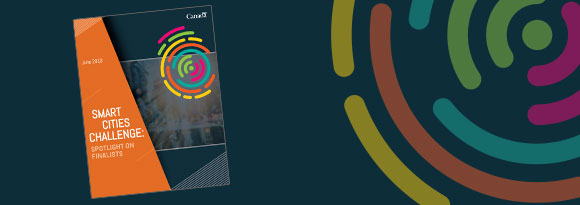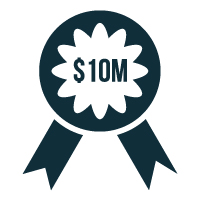City of Guelph and Wellington County, Ontario
This page has been archived on the Web
Information identified as archived is provided for reference, research or recordkeeping purposes. It is not subject to the Government of Canada Web Standards and has not been altered or updated since it was archived.
The first round of the Smart Cities Challenge is closed. The Government of Canada announced the four winners (City of Montréal, Québec; Nunavut Communities, Nunavut; City of Guelph and County of Wellington, Ontario; and Town of Bridgewater, Nova Scotia) on May 14, 2019.

Executive Summary
- PDF Version (386.19 KB)
- HTML Version
"The Smart Cities application is going to be a fantastic opportunity to catalyze entrepreneurial ingenuity in Guelph-Wellington."
– Kithio Mwanzia, President and CEO, Guelph Chamber of Commerce
"Our food future has the potential to be truly transformative. Data and technology can help enable Canadian innovation, but only if we have a clear vision for the future."
– final proposal
Challenge Statement
Guelph/Wellington will become Canada's first technology-enabled Circular Food Economy, reimagining an inclusive food-secure ecosystem that increases access to affordable, nutritious food by 50%, where "waste" becomes a resource, 50 new circular businesses and collaborations are created, and circular economic revenues are increased by 50%: 50x50x50 by 2025.
Summary
Food is a fundamental requirement of life on this planet. However, the basic structure of today's linear "take-make-dispose" food system is unsustainable — economically, socially and environmentally.
Guelph-Wellington aims to become Canada's first circular food economy, bringing our food system and communities back into healthy balance. Through our rural-urban partnership, we will enhance access to nutritious food, turn "waste" into valuable resources and create new economic opportunities.
Situated in the heart of Ontario's Innovation Corridor, Guelph/Wellington is a hub of food innovation and environmental sustainability, making us uniquely positioned to achieve this vision. Leveraging local expertise, big data and the latest technology, we will transform our food ecosystem into a connected "living lab" where researchers, social innovators, farmers, entrepreneurs and other community partners collaborate to solve complex food problems.
The Smart Cities Challenge is an important catalyst, enabling us to fund impactful circular food projects, create collaboration spaces, undertake baseline data mapping to guide programs and planning, create a suite of digital tools, and more.
Together, we will build the "Circular Food Community of the Future," creating positive quadruple bottom line outcomes — prosperity, planet, people and purpose — and share the roadmap with the communities across the country and around the world.

Spotlight on Finalists:
City of Guelph and Wellington County, Ontario
Population: 222,726
Focus Areas:


Prize Category:

#smartcitiesCanada
The Jury's Perspective
Read the transcript
Hi, I'm Lisa Holmes. I live in the town of Morinville, Alberta. I'm the vice president of corporate development for Northlands in Edmonton, and I'm the former mayor of Morinville and the former president of the Alberta Urban Municipalities Association.
As a former municipal politician, I knew the value the "Smart City Challenge" would bring to communities across Canada. The opportunity for our own municipalities and communities to be innovative and to be successful in bringing those ideas forward to the federal government to actually get implemented; it's just such a wonderful opportunity and I'm really excited for all of these proposals to not just be implemented in their own communities, but to be spread out across the country.
I was really really excited to see a community that focused on food. I work for the oldest agricultural society in Alberta and a lot of the mandate that we have is dealing with the issue of food security. The city of Guelph, they performed a proposal that was inspiring, it was innovative. They looked at food as a system and how they are able to take that system and really move it and break it into projects that could be meaningful.
The Finalist's Perspective
Read the transcript
The smart cities challenge is a competition that called in Canadian communities to explore how data and connected technology can achieve meaningful outcomes for residence.
On screen:
Smart Cities Challenge
Winning communities
School
The finalists
$10M category: City of Guelph and Wellington County, Ontario
Tell us about your team and your community
Cath Kennedy (Manager, Policy and Intergovernmental Relations, City of Guelph): we have a great team that encompasses both the university and the college, social entrepreneurs, innovators, researchers, academics, and we're all coming together to solve a big bold problem of how do we move from a linear system and the food distribution to a circular system where we can increase access to affordable nutritious food, how we can reduce waste as a resource and how can we increase circular businesses and jobs within our community.
On screen: Why did you enter the challenge?
Cath Kennedy (Manager, Policy and Intergovernmental Relations, City of Guelph): we applied to the challenge because we know that in the city of Guelph in the county of Wellington, food and food issues is in our DNA. So, we knew that the challenge that we needed to solve was around food and food security and food waste. And so we were able bring the community together in a very comprehensive way, to solve something that we've been working on for years, but we need to have a more concerted effort to solve this problem.
On screen: Challenge statement: Guelph/Wellington will become Canada's first technology-enabled Circular Food Economy, reimagining an inclusive food-secure ecosystem that increases access to affordable, nutritious food by 50%, where “waste” becomes a resource, 50 new circular businesses and collaborations are created, and circular economic revenues are increased by 50%: 50x50x50 by 2025.
Join the conversation: #smartcitiesChallenge
Infrastructure Canada
- Date modified: